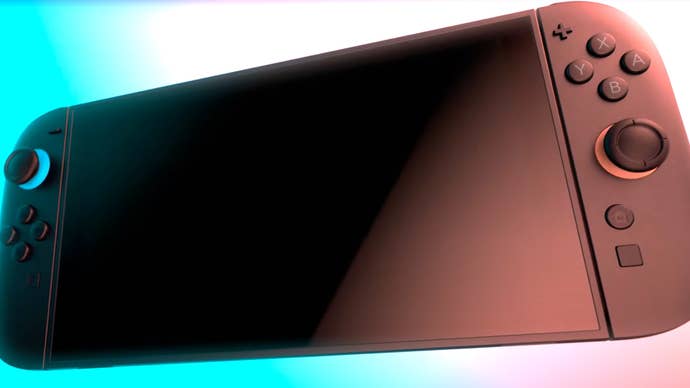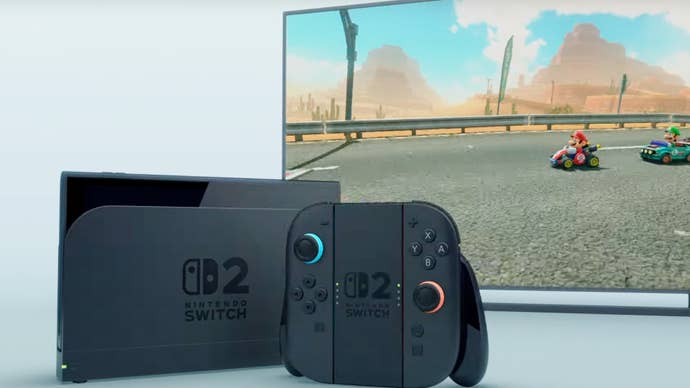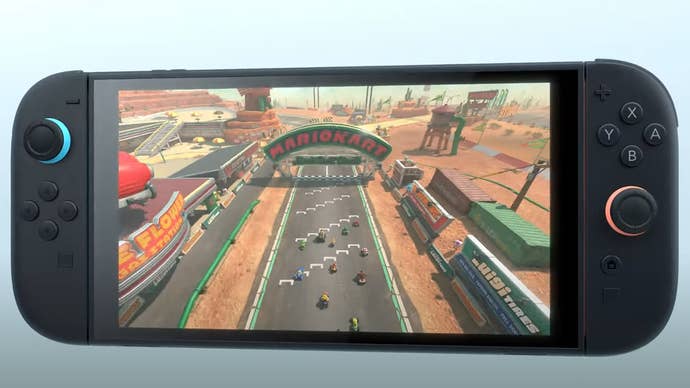And there you have it: the Nintendo Switch 2 has been revealed. From the fevered speculation and rampant leaking it was pretty clear that whatever Nintendo revealed the speculation from fans, influencers, commentators and analysts would be intense. A couple of minutes of snazzy renders of the machine swishing about, deliberately low on detail, would do just fine.
Some of that commentary, naturally, would be unbearable. It was minutes before I saw my first ‘I want more and I want it now’ meltdown, with a presumptuous demand and impetuous anger that’d make Veruca Salt proud. Like Salt, these people bloody well deserve to get deposited into the garbage chute. Have some damn patience.
But I saw another common thread in reactions that surprised me: the idea that by releasing a relatively iterative follow-up machine to the Switch, Nintendo had somehow lost its spark of creativity. Is the Switch 2 a capitulation on the Switch’s mission to “surprise and delight” players, as outlined by the late Satoru Iwata back when that console was still known as the NX? Well, er – no, it isn’t. And to think so is silly, to be frank.
In the Switch 2, I see a path Nintendo has trodden before. I sometimes think the earth-shattering nature of the Wii and DS has distorted the way we think about the company. The truth is, Nintendo hasn’t always been one to take those big swings. In fact, Nintendo has done this sort of sequel-based hardware a lot.
What is the Super Nintendo, if not a gently iterative, powered-up follow-up to the NES? It is that, and I’ll tell you what else it is: one of the greatest consoles of all time. So too is the Game Boy Advance, which is quite literally an ‘advanced’ version of the hardware that came before – its greatest innovation was a couple of extra buttons, which itself were borrowed from the SNES.

I’d never argue that either of these machines, both slam dunks, lacked the Nintendo spirit. It was just delivered in different ways; in new control methods delivered by peripherals or carts with tech packed right into them, or simply in clever new gameplay design that the powered-up hardware allows. When I think of Nintendo surprising and delighting, I’m thinking as much about the astonishing design language jumps from Metroid 1 to Super Metroid or the exuberant delights of Wind Waker’s art as much as I am about Wii Bowling.
And even on Wii and Switch, some of the greatest delights came through external peripherals anyway – in the fitness space alone, the balance board and Ring Fit exist as an add-on to the hardware, and were nowhere in sight at launch.
Even when the iterative sequel was less successful, as in the N64 to GameCube transition, Nintendo discovered quiet ways to make beloved and memorable cult games that differentiated themselves from the rest of the market. But the same can be said on the other side of the coin, too: the 3DS offered a hot and exciting new system-shifting gimmick, but it turned out to be a bit s**t, leaving the majority of the innovation in the games to instead come from delightful design rather than shouty new features.

It’s true that the machine itself doesn’t surprise. It’s exactly what I expected; a refinement of a design that works brilliantly. The Switch arguably relaunched the concept of what portable gaming can be, and in the Switch 2’s design one can easily see an invigorated and validated Nintendo casting a side eye to the deluge of better-looking PC handhelds and going, “well, we can match that”. The Switch 2 will also have one thing that those machines won’t ever have: Nintendo’s infectious, joyous approach to game design.
The Switch 2 will have new features. The deliberately-vague trailer has hints at this – the joy-cons dragging along the surface like mice, which immediately conjures up thoughts of Mario Paint, or Maker, or an Xbox collab for an Age of Empires port. New powered-up Joy Cons are likely to lead to a range of new peripheral possibilities which could lead to further innovation.
Some of the greatest new features may indeed be inside the machine, too. I’d be the first to argue that we’re rapidly approaching or indeed have already reached a point of diminishing returns in terms of hardware upgrades for graphics – but hardware upgrades aren’t always about visuals. Better hardware can deliver scope and scale, something that doesn’t always just mean ‘bigger’ – it can mean new gameplay ideas.

I suppose what I’m saying, in the end, is that it’s all too soon to judge. We can absolutely entertain the argument that this was a poorly-conceived reveal. If your machine looks near-identical to its predecessor, perhaps your first trailer shouldn’t solely focus on its looks. But in the end, if I trust any company to pull a rabbit out of the hat, it’s Nintendo. The hardware is samey, it’s true – but we truly have been here before, and in each less-gimmicked generation Nintendo has continued to ‘Upend the Tea Table’, as Miyamoto was known to do, with game design and clever, silly add-on peripherals regardless. And I certainly wouldn’t underestimate what a significant amount more processing power might allow Nintendo to do in game design terms.
In short, without seeing what Nintendo plans to do with this new hardware, all of the hand-wringing is very silly. And, oh god, we’re going to have to listen to all this rubbish until April, aren’t we? Fire up the stasis chamber.









Add comment